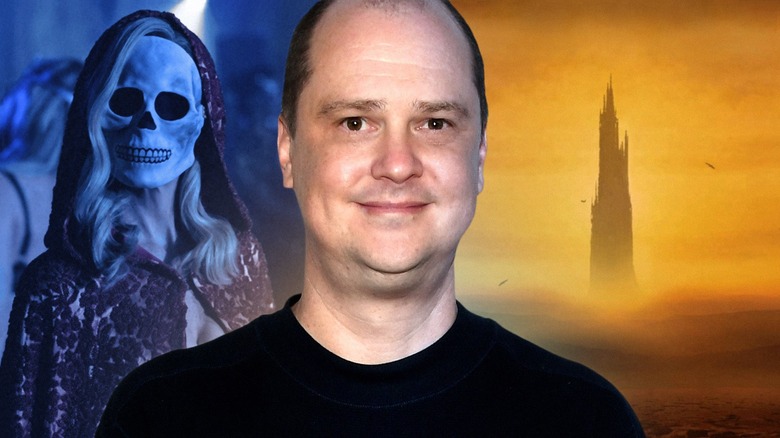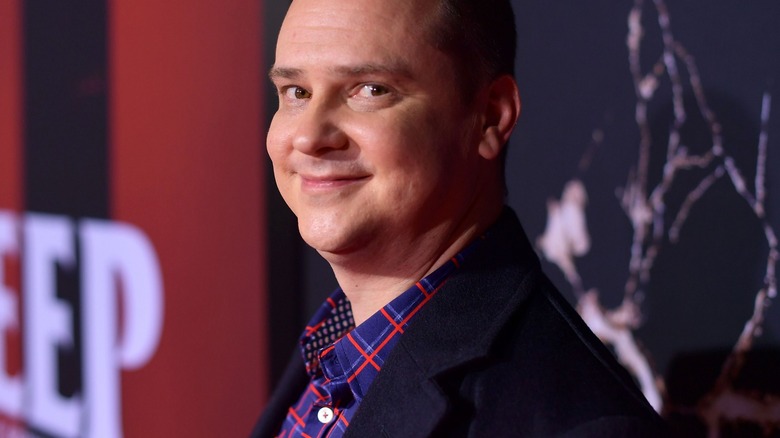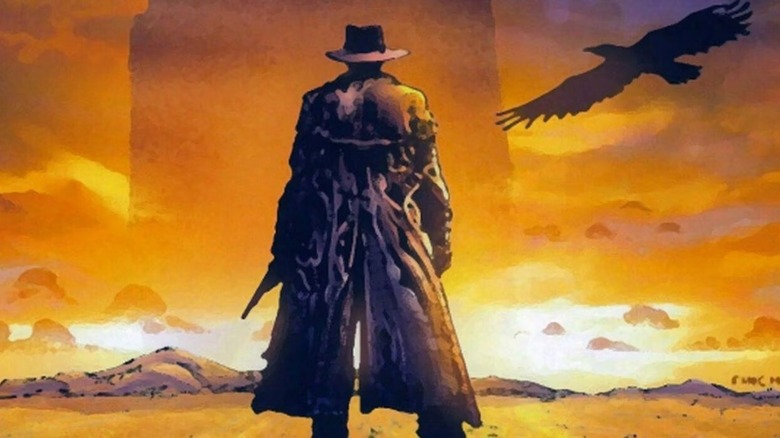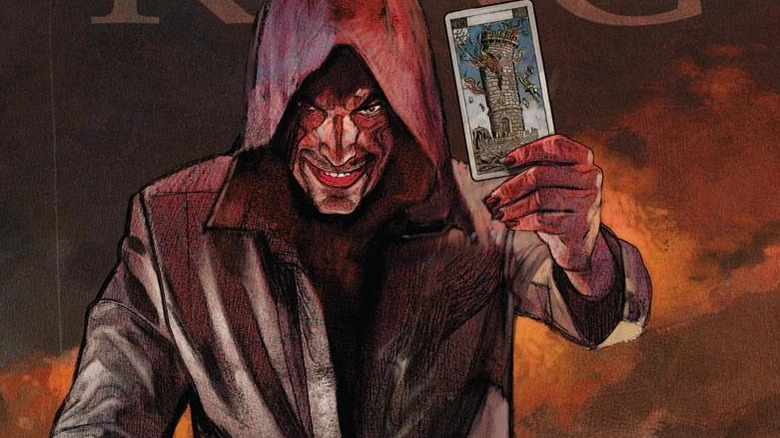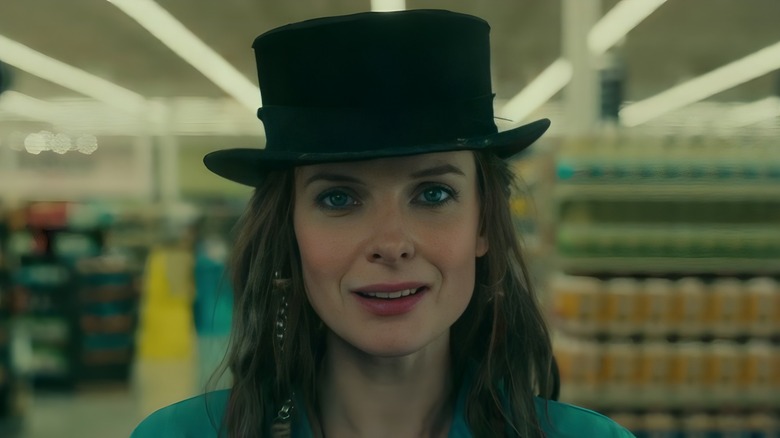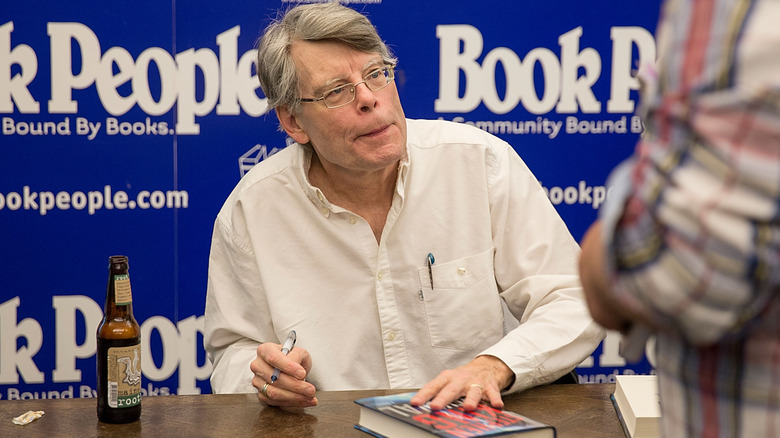Fall Of The House Of Usher Proves Mike Flanagan Will Make Major Changes To The Dark Tower (& That's A Good Thing)
"The Fall of the House of Usher" is Mike Flanagan's best series yet. His reimagining of Edgar Allan Poe's macabre tale is ambitious and masterfully weaves together several of the author's iconic stories into a singular narrative about a powerful family's downfall. What's more, its success is bound to ignite a surge of momentum for Flanagan as he gets ready to tackle "The Dark Tower" following the SAG-AFTRA strike.
Adapting Stephen King's magnum opus was once considered an impossible feat — a notion that was given more weight after the 2017 movie starring Idris Elba went catastrophically wrong. However, Flanagan has dreamed of giving it a go for quite some time, and he recently told Fangoria that it's close to becoming a reality. "I feel really good about where we are. Oddly, where we are at the moment is completely frozen, because of the strike, but we had a wonderful spring with it and we're making enormous progress on it."
Flanagan hopes to adapt "Dark Tower" as a five-season TV series and two feature films. That's going to be a mammoth task indeed, but it's probably the only way to do justice to King's sprawling fantasy-western saga, which currently boasts eight novels, as well as short stories, comics, and more. The good news, though, is that Flanagan has a history of successfully translating King's most challenging works onto the screen. Sure, he generally understands every author he adapts, but King is one he's particularly on the same wavelength as, and he isn't afraid to make bold changes. "Fall of the House of Usher" proves this, and this mentality will serve him well going into a project that's as daunting and audacious as "The Dark Tower."
Mike Flanagan's Dark Tower won't be afraid to take risks
Viewers shouldn't go into Mike Flanagan's "The Fall of the House of Usher" expecting a beat-for-beat adaptation of Edgar Allan Poe's classic tale of terror. Yes, there's a creepy house, a dysfunctional family, and a premature burial at the heart of the horror. However, the Netflix series uses Poe's modest gothic chiller as a launchpad to tell a sprawling story about modern times.
Poe's story only features three characters — the unnamed narrator, Roderick Usher, and his sister, Madeline Usher. The Netflix adaptation, meanwhile, adds children to the Usher clan, all of whom are corrupt, selfish monsters who make it easy for viewers to sympathize with the supernatural entities that show up to off them. What's more, Roderick (Bruce Greenwood) is reimagined as the head of a corrupt pharmaceutical empire, as opposed to being a mere troubled man in a spooky house. The unnamed narrator, meanwhile, is replaced with a contemporary take on C. Auguste Dupin (Carl Lumbly), the Poe character who essentially birthed detective fiction.
Flanagan also makes changes to the other Poe stories adapted here. From "The Masque of the Red Death" to "The Tell-Tale Heart," all of his classic works have been modernized and connected to the overarching plot of the series. The decision to reimagine "Masque of the Red Death" as a sex-rave for social media influencers and corrupt celebrities is especially fresh, but it's probably the type of story that Poe would write if he were alive today.
Now, Flanagan will bring a different mindset to "Dark Tower," as King's fantasy series is unlike anything he's worked on before. That said, he'll probably tell this story in a way that feels refreshing, while still honoring the core ethos of the original stories.
The Dark Tower will be Mike Flanagan's magnum opus
Mike Flanagan has enjoyed a lot of success in movies and television, but his stories are quite modest compared to "The Dark Tower." King's fantasy series is a magnum opus that tells the story of a gunslinger who traverses grandiose magical realms in search of his adversary. It deals with parallel dimensions, epic adventures, and grand-scale worldbuilding that's on par with Marvel Studios and "Lord of the Rings." Flanagan is entering the big leagues with this one, but he's been building toward it for quite some time. Plus, "The Dark Tower" will still allow him to pluck from its author's entire oeuvre as the Kingverse is a real thing.
"The Dark Tower" books delve into the concept of "Ka," which signifies lifeforce, destiny, and fate in Stephen King's novels. It's mentioned in several stories, including "The Stand" and "The Tommyknockers." Pennywise exists in the same canon as "Dark Tower" as well, so don't be surprised if we get a cameo from the child-eating clown and other beloved (or feared) characters from King's magnificent worlds. The titular tower is the nexus point in which all of King's universes meet, and that opens up a world of interesting possibilities for the upcoming adaptation.
In short, Flanagan's series will embrace a King multiverse, which is fitting as his previous literary adaptations are a hodgepodge of their respective author's whole bibliographies. Flanagan has already admitted that he wants to include Abra Stone (Kyliegh Curran) from his own adaptation of "Doctor Sleep" in his "Dark Tower," proving that he's considering these ambitious ideas.
A direct Dark Tower adaptation is the wrong approach
Mike Flanagan's biggest challenge with "The Dark Tower" will be distilling, rearranging, and repurposing elements from the books to create a cohesive story for television and film. The novels have more material than the adaptation will be able to pack into five seasons and two movies. Meanwhile, some characters will have to debut earlier than they do in the novels for the sake of establishing relationships and laying the foundations for long-term storylines.
For example, the protagonist in Stephen King's book series, Roland Deschain, has fan-favorite allies in the form of Eddie and Susannah Dean. They aren't introduced until "The Dark Tower II: The Drawing of the Three," but Flanagan's adaptation should probably introduce them in Season 1 to please the die-hards and establish their relationship with our hero. Similarly, Jack Mort, a vicious killer Roland encounters in the same novel, is a perfect antagonist to introduce early on while Roland gradually finds his way to more formidable foes like The Crimson King. The Man in Black, of course, must be a presence from the very beginning of Season 1, but the way his mysteries are unpeeled for viewers should probably occur somewhat differently.
These are things to consider, but Flanagan knows this already. Furthermore, he'll have to get creative with the Kingverse concept, as some of the specific cross-pollination that exists in the author's novels could be awkward to translate to the screen.
Mike Flanagan's adaptation should take liberties with the Kingverse
Mike Flanagan has already expressed his intentions to bring characters from "Doctor Sleep" into "The Dark Tower," and he has some interesting ideas. While speaking to Empire, he revealed that he believes Dandelo, a shapeshifting vampire, is related to the True Knot, meaning that Rose the Hat (Rebecca Ferguson) and other characters from "The Shining" universe could make an appearance.
There's also a passage in "The Dark Tower IV: Wizard and Glass" that sees Roland Deschain and his crew travel through the version of Topeka, Kansas that was introduced in "The Stand." This opens the door to some crossover with the "Stand" miniseries from 2020 or even the 1994 version (if the nods to "The Shining" in "Doctor Sleep" prove anything, it's that Flanagan is a master of recreating worlds from classic King adaptations). Then again, this property also risks disrupting the narrative of his "Dark Tower" series, as there are no real solid foundations to build from, so perhaps a bolder approach is needed.
Instead of "The Stand," then, Flanagan's "Dark Tower" might create more buzz if it blends with other stories in the Kingverse. King's 2022 novel "Fairy Tale," for example, is currently being adapted into a film by Paul Greengrass. Assuming that the movie actually gets made and is well-received, Flanagan could opt to explore this fantastical world within the context of his own series, as it'll give him an established on-screen property to connect it to. Whether this means replacing Topeka with Empis from the gray skies of "Fairy Tale" is something Flanagan could consider. The possibilities are truly endless.
Similarly, "Dark Tower" could lay the groundwork for some spin-off series set in the same universe. For example, the Crimson King is a main antagonist in King's "Insomnia" and "Black House" novels, neither of which has been adapted for the screen yet. Hollywood loves milking IPs, and the "Dark Tower" could launch spin-offs with actual substance.
Mike Flanagan understands Stephen King, and his Dark Tower will prove it
Once upon a time, "Gerald's Game" was regarded as one of Stephen King's most unfilmable stories. However, Mike Flanagan chuckled at this statement and proceeded to make a movie that King described as "Horrifying, hypnotic, terrific" on his X (formerly known as Twitter) account in 2017. "Gerald's Game" being as good as it is should be enough reassurance to make people trust in Flanagan's ability to do justice to "The Dark Tower," as both stories were once deemed impossible to adapt.
Flanagan also received plaudits for his adaptation of "Doctor Sleep," which works as both a retelling of King's literary sequel to "The Shining" and Stanley Kubrick's 1980 film. King is a vocal critic of Kubrick's film, while Flanagan's "Doctor Sleep" is a love letter to it. However, King loved the way in which Flanagan brought both worlds together and flipped them to suit his own cinematic vision. As he told Entertainment Weekly, "I read the script very, very carefully and I said to myself, 'Everything that I ever disliked about the Kubrick version of The Shining is redeemed for me here."
Flanagan has King's seal of approval, and the author doesn't give that to just any filmmaker who adapts his babies. However, they share similar visions as they both love telling emotive, character-driven stories with a dark edge. Sure, Flanagan's on-screen franchise will explore complex concepts on a blockbuster scale, but it will primarily focus on the heartfelt elements that make the book series a journey worth remembering after all these years. That's exactly what fans have been hoping for all these years.
